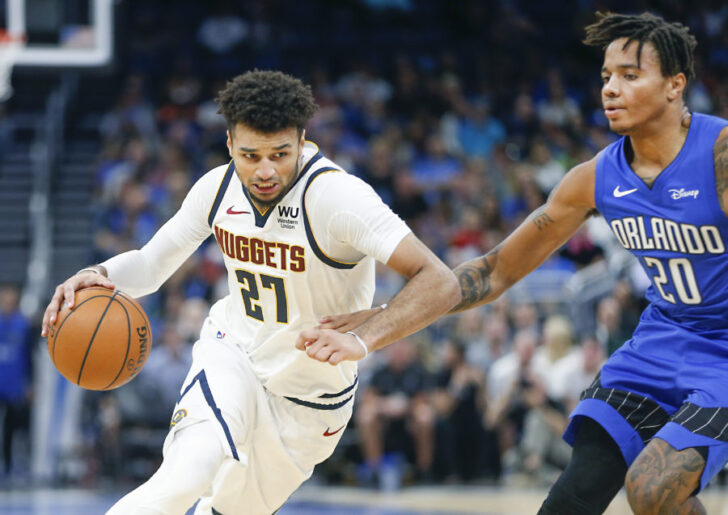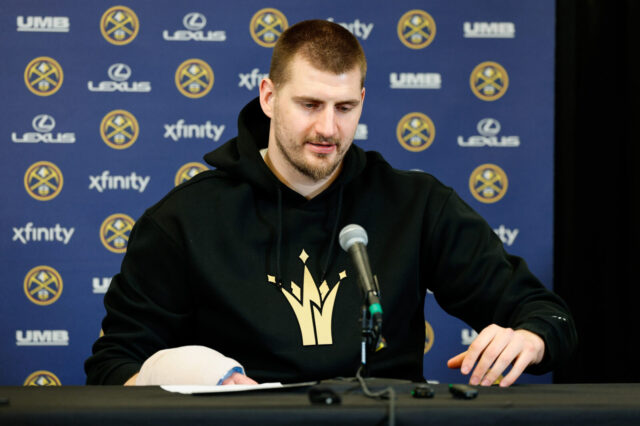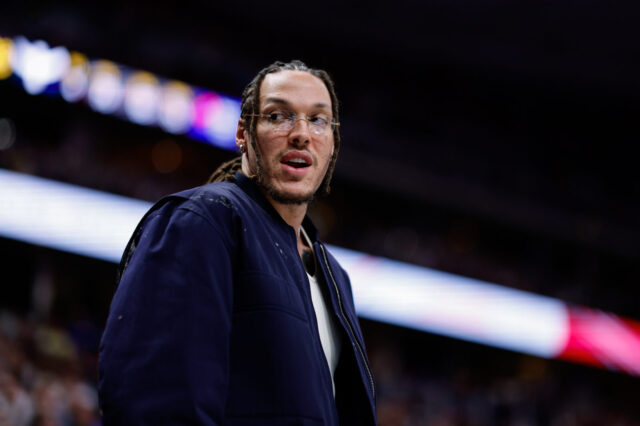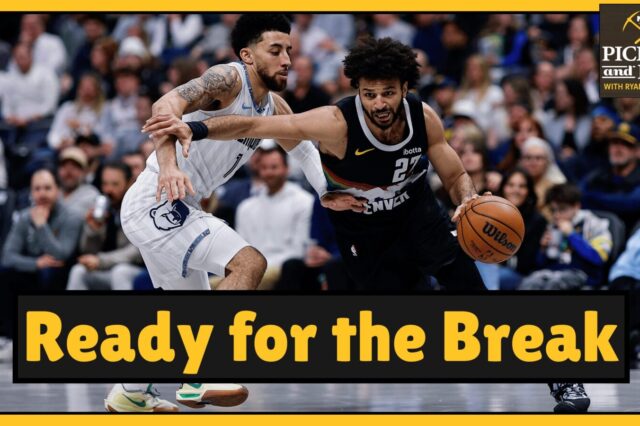As the Nuggets returned to the Mile High City after one of their most bizarre road trips in recent memory, the local media gathered at the Pepsi Center to talk to different members of the Nuggets roster and head coach Michael Malone.
As Denver continues to deal with quite a bit of on-court dysfunction, most would expect Denver’s first-team All-NBA center Nikola Jokic to speak to the media to provide some clarity on the chaos, but instead it was Jamal Murray who was requested to stand in front of reporters and answer questions about Denver’s ups-and-downs.
“What am I in?” Jamal Murray asked jokingly towards the end of his six-minute interview. “The interrogation room?”
This has become a new reality for the 22-year-old Murray, who has had to step into shoes that are extremely difficult to fill. Not only are the Nuggets in the midst of a season that carries the weight of championship contention, but Denver is still the second-youngest team in the National Basketball Association with an average age of 24.7 years old. A team that young needs a player to step up and lead them.
Yes, Paul Millsap is a veteran presence and Mason Plumlee has been an incredible teammate, but the Nuggets need more than just Millsap — who is not the most vocal of individuals — and Mason Plumlee — who is only playing 16 minutes each game — to lead them.
And it has been Murray who has voluntarily stepped into that role.
In order to explain how Murray has been able to emerge as a leader, we have to go back to Halloween night, which was a night that many members of the Nuggets organization would like to forget.
The Nuggets were in New Orleans to take on the Pelicans while looking to bounce back from a fourth-quarter collapse against the Dallas Mavericks, but by the time the final buzzer sounded, Denver had lost 122-107 which led to Malone calling “bullshit” on Denver’s championship hopes during his postgame press conference and saying that his team needs to show him and not just talk about it.
“I was so disappointed in our effort in that New Orleans game and it was not just Nikola Jokic; it was everybody,” Malone explained. “When you give up 37 points in transition, that is a team-wide effort. Our bench was not into the game. We were not engaged. We were not up. After the game, I watched the game that night and I think guys actually played fairly hard, but not as hard as we needed to. Just the overall engagement was not there and the energy was not sustained for 48 minutes.”
Denver had shown signs that they were still far from at their best through the first four games of the season, but after getting pummeled by 15 points by the Pelicans, who were winless at the time, concern began to grow rapidly.
That is when Murray stood up in the locker room and made his voice known. He spoke out about their lack of urgency and challenged his teammates to fight more as a team and get back to their “playoff mentality”, as he put it.
“Speaking to the team and gathering everybody together; I think that is one step towards getting back to the playoff mentality that we had where every game we were locked in, every game we are covering for each other — mistakes or not — and just being vocal, keeping the energy up, and keeping a positive attitude,” Murray explained. “In the playoffs, a lot of things went south, but we maintained that attitude down 2-1 in both series. So just having that bounce-back mentality whether it is back-to-back games or back-to-back plays.”
Murray was not just speaking to his teammates either. He is guilty of issues with energy and engagement just like the rest of the roster and was quick to point out his own flaws when discussing the challenges he gave to his teammates.
“It was because I was not playing the way I needed to play,” Murray explained when asked why he felt the need to speak up after getting beaten by the Pelicans. “I felt like I should have been scoring more, should be talking more, should be getting guys open more, should be creating more. Sometimes we just run offense to run offense and I think I need to be more aggressive looking for my shot in the offense and looking for space to create.”
But then Murray began to open up about why he felt the need to emerge as a vocal leader — not just as an on-court producer — and his words spoke volumes.
“I just want to be vocal. (Jokic) doesn’t do too much talking. He just kind of leads by example, but when he’s not playing the way he needs to play, I think I have to talk more and get everybody going. Show that if our defense plays or if we have our energy up, we can go into any arena and win.”
Murray openly discussed how Jokic is more of a ‘lead by example’ type of star, but also noted that when Jokic is playing bad, someone needs to take ownership of the team and get Denver back on course which is a role Murray has happily accepted.
That seemed to be one of the biggest reasons for Murray’s outspoken perspective. He knows his team needs to be led and Jokic is not currently doing that job to the best of his abilities. So when the Nuggets tipped off against the Orlando Magic and Jokic was back to struggling (in the first half), Murray knew exactly what he had to do.
“We just needed a win,” Murray stated. “If we lost that one, it would have been three-straight losses. That was a do-or-die game for us. If we lost that, I think it would have sent a message to our fans and organization that we are not ready to play. I wanted to make sure I came out and be aggressive and do what I can to help this team win.”
After bringing his teammates together to challenge them to be better, Murray did what he coach had implored his team to do two nights prior — Murray not only talked about those challenges, but met them head on and walked the walk.
Murray showed his teammates what kind of effort and urgency it takes to truly compete for a title. There was no fluff or anything; just hard-nosed basketball with the intent of out-working the opponent standing across from him.
“I though Jamal — from beginning to end of last game — was great,” Malone explained. “I give him a lot of credit because he is embracing being a leader. He stepped up after the New Orleans game and spoke what was on his mind and what was on his heart, but more importantly he followed that up with his actions. He brought it. He picked up full court. We recovered 16 loose balls in that Orlando game and he led the charge in that.”
Murray’s numbers against the Magic — 22 points, four rebounds and two assists — were far from mind-blowing, but that wasn’t the point. Murray was a tenacious defender for every last second of the 32 minutes and 16 seconds he played. He was moving the ball and making decisive decisions. He was getting out in transition and playing with pace. Even more importantly, he was speaking up during huddles and being a loud and supportive voice from the bench when the reserves were in.
Murray fully embodied exactly what the Nuggets needed in Orlando to end their losing streak and it was the difference between a win and a loss.
When Malone was asked if he saw a change in effort from his team after Murray’s speech, he spoke glowingly about his team; particularly the players who were on the bench.
“Oh, I saw a much, much different team in terms of energy, engagement,” Malone said. “I loved our bench. In the third quarter — which was our best quarter of the game — the guys on our bench were up the whole time supporting, cheering, and rooting for their teammates. When I went to our bench unit, the starters were on our bench engaged and supporting the guys on the floor. I felt a lot more energy, I felt a lot more pace, I felt a lot more urgency, and we got back to defending.”
That sure sounds like Murray was able to accomplish exactly what he set out to do. The Nuggets were far from perfect, they still could not hit an open shot if their lives depended on it, but the difference against the Magic was the energy and intensity that they played with despite those issues.
And do not forget; that energy and intensity was created two nights before when the Nuggets 22-year-old starting point guard stood up in front of his team and made his voice known and challenged his team to be better.
When Murray was asked about his speech and if his teammates took it to heart, he made sure to note that he was focused on leading regardless of what the future holds for this Nuggets team.
“I don’t really look at it like that,” Murray said when asked if it felt like his speech to the team resonated. “I just try to speak on it and go out and show it and go out and play it. Hopefully my play shows that. I tried to pick up full court and I tried to get Monte to pick up full court and he did.
“It is just going out there and showing it. It is just like learning. When you see someone do something, you try to copy it and try to match it. Seeing it is one thing and what I am doing is another.”
Now the real test begins for Murray’s leadership. Can his impact last longer than one game? Will his words echo in the minds of his teammates long after they were spoken? Can he carry the burden of being the Nuggets alpha at just 22-years-old?
These are all question that can only be answered in time, but one thing is for sure: Murray’s acceptance of a leadership role is not only real, but welcomed.



